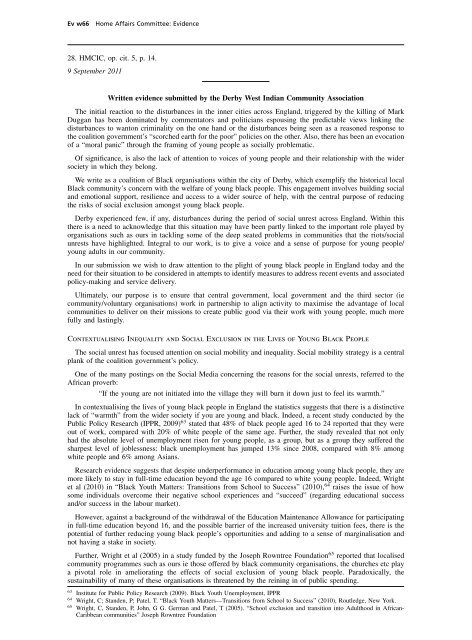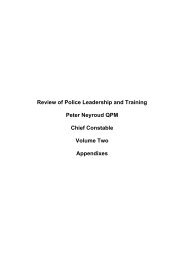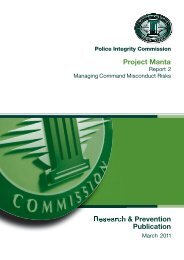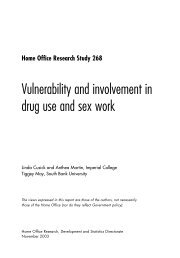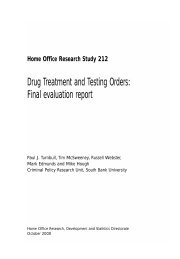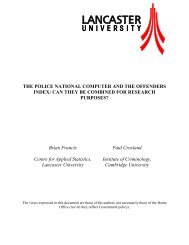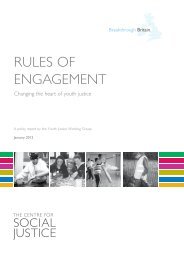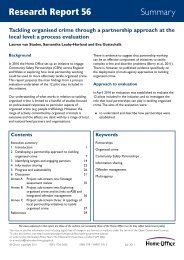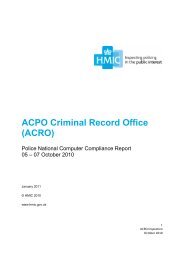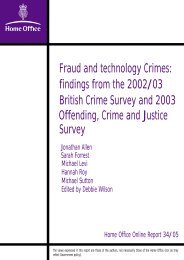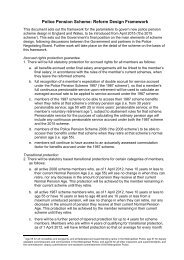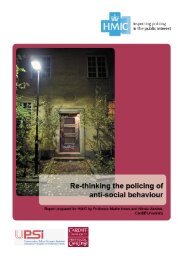Policing Large Scale Disorder: Lessons from the disturbances of ...
Policing Large Scale Disorder: Lessons from the disturbances of ...
Policing Large Scale Disorder: Lessons from the disturbances of ...
You also want an ePaper? Increase the reach of your titles
YUMPU automatically turns print PDFs into web optimized ePapers that Google loves.
Ev w66 Home Affairs Committee: Evidence<br />
28. HMCIC, op. cit. 5, p. 14.<br />
9 September 2011<br />
Written evidence submitted by <strong>the</strong> Derby West Indian Community Association<br />
The initial reaction to <strong>the</strong> <strong>disturbances</strong> in <strong>the</strong> inner cities across England, triggered by <strong>the</strong> killing <strong>of</strong> Mark<br />
Duggan has been dominated by commentators and politicians espousing <strong>the</strong> predictable views linking <strong>the</strong><br />
<strong>disturbances</strong> to wanton criminality on <strong>the</strong> one hand or <strong>the</strong> <strong>disturbances</strong> being seen as a reasoned response to<br />
<strong>the</strong> coalition government’s “scorched earth for <strong>the</strong> poor” policies on <strong>the</strong> o<strong>the</strong>r. Also, <strong>the</strong>re has been an evocation<br />
<strong>of</strong> a “moral panic” through <strong>the</strong> framing <strong>of</strong> young people as socially problematic.<br />
Of significance, is also <strong>the</strong> lack <strong>of</strong> attention to voices <strong>of</strong> young people and <strong>the</strong>ir relationship with <strong>the</strong> wider<br />
society in which <strong>the</strong>y belong.<br />
We write as a coalition <strong>of</strong> Black organisations within <strong>the</strong> city <strong>of</strong> Derby, which exemplify <strong>the</strong> historical local<br />
Black community’s concern with <strong>the</strong> welfare <strong>of</strong> young black people. This engagement involves building social<br />
and emotional support, resilience and access to a wider source <strong>of</strong> help, with <strong>the</strong> central purpose <strong>of</strong> reducing<br />
<strong>the</strong> risks <strong>of</strong> social exclusion amongst young black people.<br />
Derby experienced few, if any, <strong>disturbances</strong> during <strong>the</strong> period <strong>of</strong> social unrest across England. Within this<br />
<strong>the</strong>re is a need to acknowledge that this situation may have been partly linked to <strong>the</strong> important role played by<br />
organisations such as ours in tackling some <strong>of</strong> <strong>the</strong> deep seated problems in communities that <strong>the</strong> riots/social<br />
unrests have highlighted. Integral to our work, is to give a voice and a sense <strong>of</strong> purpose for young people/<br />
young adults in our community.<br />
In our submission we wish to draw attention to <strong>the</strong> plight <strong>of</strong> young black people in England today and <strong>the</strong><br />
need for <strong>the</strong>ir situation to be considered in attempts to identify measures to address recent events and associated<br />
policy-making and service delivery.<br />
Ultimately, our purpose is to ensure that central government, local government and <strong>the</strong> third sector (ie<br />
community/voluntary organisations) work in partnership to align activity to maximise <strong>the</strong> advantage <strong>of</strong> local<br />
communities to deliver on <strong>the</strong>ir missions to create public good via <strong>the</strong>ir work with young people, much more<br />
fully and lastingly.<br />
Contextualising Inequality and Social Exclusion in <strong>the</strong> Lives <strong>of</strong> Young Black People<br />
The social unrest has focused attention on social mobility and inequality. Social mobility strategy is a central<br />
plank <strong>of</strong> <strong>the</strong> coalition government’s policy.<br />
One <strong>of</strong> <strong>the</strong> many postings on <strong>the</strong> Social Media concerning <strong>the</strong> reasons for <strong>the</strong> social unrests, referred to <strong>the</strong><br />
African proverb:<br />
“If <strong>the</strong> young are not initiated into <strong>the</strong> village <strong>the</strong>y will burn it down just to feel its warmth.”<br />
In contextualising <strong>the</strong> lives <strong>of</strong> young black people in England <strong>the</strong> statistics suggests that <strong>the</strong>re is a distinctive<br />
lack <strong>of</strong> “warmth” <strong>from</strong> <strong>the</strong> wider society if you are young and black. Indeed, a recent study conducted by <strong>the</strong><br />
Public Policy Research (IPPR, 2009) 63 stated that 48% <strong>of</strong> black people aged 16 to 24 reported that <strong>the</strong>y were<br />
out <strong>of</strong> work, compared with 20% <strong>of</strong> white people <strong>of</strong> <strong>the</strong> same age. Fur<strong>the</strong>r, <strong>the</strong> study revealed that not only<br />
had <strong>the</strong> absolute level <strong>of</strong> unemployment risen for young people, as a group, but as a group <strong>the</strong>y suffered <strong>the</strong><br />
sharpest level <strong>of</strong> joblessness: black unemployment has jumped 13% since 2008, compared with 8% among<br />
white people and 6% among Asians.<br />
Research evidence suggests that despite underperformance in education among young black people, <strong>the</strong>y are<br />
more likely to stay in full-time education beyond <strong>the</strong> age 16 compared to white young people. Indeed, Wright<br />
et al (2010) in “Black Youth Matters: Transitions <strong>from</strong> School to Success” (2010), 64 raises <strong>the</strong> issue <strong>of</strong> how<br />
some individuals overcome <strong>the</strong>ir negative school experiences and “succeed” (regarding educational success<br />
and/or success in <strong>the</strong> labour market).<br />
However, against a background <strong>of</strong> <strong>the</strong> withdrawal <strong>of</strong> <strong>the</strong> Education Maintenance Allowance for participating<br />
in full-time education beyond 16, and <strong>the</strong> possible barrier <strong>of</strong> <strong>the</strong> increased university tuition fees, <strong>the</strong>re is <strong>the</strong><br />
potential <strong>of</strong> fur<strong>the</strong>r reducing young black people’s opportunities and adding to a sense <strong>of</strong> marginalisation and<br />
not having a stake in society.<br />
Fur<strong>the</strong>r, Wright et al (2005) in a study funded by <strong>the</strong> Joseph Rowntree Foundation 65 reported that localised<br />
community programmes such as ours ie those <strong>of</strong>fered by black community organisations, <strong>the</strong> churches etc play<br />
a pivotal role in ameliorating <strong>the</strong> effects <strong>of</strong> social exclusion <strong>of</strong> young black people. Paradoxically, <strong>the</strong><br />
sustainability <strong>of</strong> many <strong>of</strong> <strong>the</strong>se organisations is threatened by <strong>the</strong> reining in <strong>of</strong> public spending.<br />
63 Institute for Public Policy Research (2009). Black Youth Unemployment, IPPR<br />
64 Wright, C; Standen, P; Patel, T. “Black Youth Matters—Transitions <strong>from</strong> School to Success” (2010), Routledge, New York.<br />
65 Wright, C, Standen, P, John, G G. German and Patel, T (2005). “School exclusion and transition into Adulthood in African-<br />
Caribbean communities” Joseph Rowntree Foundation


